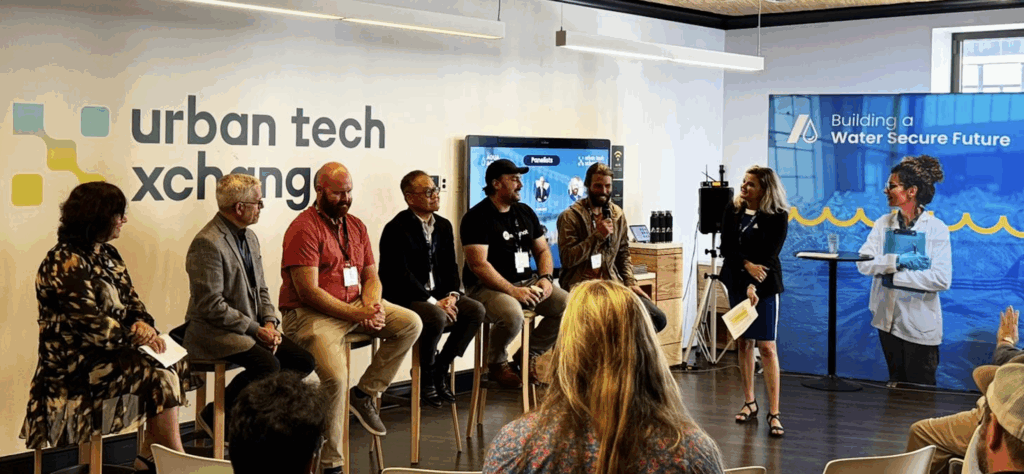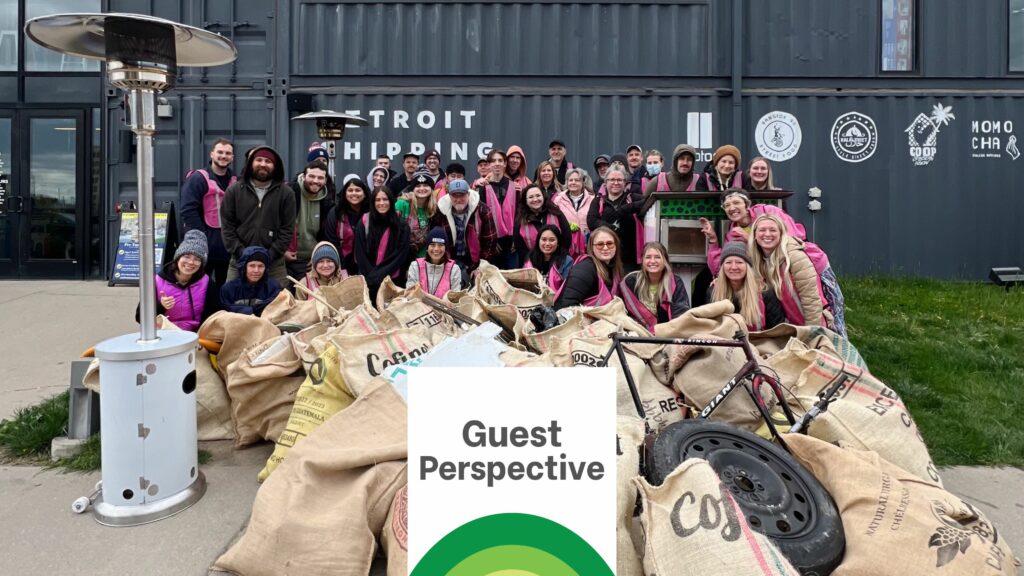AquaAction Chooses Detroit for U.S. Headquarters

Founded in Canada, AquaAction is a nonprofit dedicated to tackling freshwater challenges through innovation and entrepreneurship. Now, the organization has chosen Detroit as its U.S. headquarters — a choice made because of Southeast Michigan’s role as a steward of the Great Lakes and a launchpad for water-tech solutions with global reach. Through initiatives like the AquaHacking and AquaEntrepreneur programs, AquaAction supports young innovators as they transform ideas into real-world technologies. SBN Detroit interviewed President Soula Chronopoulos about why Detroit was selected, the challenges and opportunities facing the region, and how water-tech could shape the next phase of Southeast Michigan’s economy. Q: What makes Detroit—and Southeast Michigan overall—a compelling region for water-tech innovation and freshwater stewardship? A: There’s a powerful momentum building in Detroit. The city has long been a symbol of resilience and grit, and now it’s fueling a new wave of entrepreneurial energy unlike what we’ve seen in other regions. With freshwater and climate change in the global spotlight, Detroit and Southeast Michigan are uniquely positioned. Sixty percent of the global economy depends on freshwater, and this part of Michigan sits on some of the world’s most critical reserves. The Great Lakes hold 21% of the planet’s freshwater resources, making them both a tremendous asset and a frontline target in the fight against climate change. This region has the chance to build something extraordinary — an economy rooted in water technology that can emerge directly from the Great Lakes. Q: How does AquaAction’s presence here help address regional freshwater challenges versus other parts of North America? A: When we considered where to establish our U.S. base, Detroit quickly stood out. Why? Because this area faces some of the toughest water challenges in the country: Flooding, affordability, pollution, and the legacy of crises like Flint. At the same time, there’s an eagerness here to be part of the solution. Detroit is a real-world test bed. If solutions can work here, they can scale across the U.S. and beyond. That’s why I often say the Midwest — and Detroit in particular — has the potential to become the Silicon Valley of water tech. Q: Can you discuss examples from the AquaHacking and AquaEntrepreneur programs that have particular relevance to Southeast Michigan? A: We ran our first Great Lakes binational challenge in 2023, and the response was incredible. Over 250 people joined, 45 teams were formed, and we launched 10 companies out of Michigan and the Great Lakes region. A few examples stand out: Motmot, based at Newlab, uses underwater robotics to detect leaks in aging water infrastructure. They’ve completed more than 40 projects. Myconaut uses bioengineered mushrooms aiming to remediate contaminated soil and keep lead out of drinking water. They recently won a grant and are testing their technology right here in Michigan. Other ventures include predictive flood modeling tools for cities and digital water management systems — both highly relevant to Southeast Michigan’s infrastructure challenges. In Quebec, similar efforts helped build a $200 million water-tech economy. Imagine what’s possible here. Q: How are young entrepreneurs being supported to translate their water-tech solutions into real-world applications in this region? A: We take a different approach. First, we’re a charity, but we’re also entrepreneurs ourselves. That perspective shapes how we build support for innovators. We’ve created an ecosystem where entrepreneurs can partner with subject-matter experts to validate their solutions. We then connect them with business leaders who help refine their models, open doors, and provide mentorship. Finally, we ensure they get into the field to test and apply their work. In Michigan, we anticipate engaging over 1,000 students and innovators in the coming years. We’re also focusing on communities including those with high unemployment. Q: What are the most pressing water-related challenges Southeast Michigan must address now—and in the coming years? A: Infrastructure is the biggest challenge. Much of it is aging and in need of major investment. Beyond that, flooding, pollution, and overall water management remain pressing concerns. There’s also the question of innovation. Detroit’s history in the automotive industry raises an important question: what comes next? I believe water technology can be the next major economic driver. The region already has supply chains, industrial capacity, and expertise that can be leveraged to build a world-class water-tech sector. Q: What barriers are startups or innovators encountering when bringing solutions to market locally? A: The greatest barrier is awareness. Climate conversations often focus on carbon, while water is overlooked. Yet 60% of the global economy runs on water. It is the lifeblood of everything, but we rarely treat it that way. That said, we’re beginning to see a shift. Policymakers, business leaders, and communities are starting to recognize the true value of water — not just as an environmental concern, but as an economic and security issue. Q: With U.S. headquarters now in Detroit, what kinds of economic or social impacts do you anticipate? A: There are two main areas of impact: Jobs and community. In Canada, we’ve helped create around 400 jobs, and we expect to do the same here. Every time we run an AquaHacking or AquaEntrepreneur program, we typically launch 10–20 companies. That means new businesses, new pilot projects, and new career opportunities. We’ve committed to the MEDC that within 12–18 months, we expect up to 35 new businesses to be launched, several pilot programs to get off the ground and at least 10–12 new staff hired at our Detroit office. Equally important is the community impact. Water is a human right, and it brings people together. We’re cultivating a new generation of innovators who see water not just as a resource but as a foundation for equity, resilience, and growth. Q: How do you envision long-term freshwater security, innovation, and resilience evolving in Southeast Michigan? A: Michigan is at a turning point. Just as it once led in mobility, the state can lead in water — in quality, flood management, pollution control, and technology development. The region has the knowledge, the infrastructure, and the industrial base to
The Cleanup Club: Working to Mitigate Plastic Pollution in the Great Lakes

HANNAH TIZEDES IS THE FOUNDER AND EXECUTIVE DIRECTOR OF THE CLEANUP CLUB Before founding The Cleanup Club, a nonprofit dedicated to protecting our communities and Great Lakes from plastic pollution through cleanups and creativity, I amassed a collection of over 100,000 pieces of plastic debris from the Great Lakes shorelines during solo cleanups. I used the colorful found objects to create thought-provoking art pieces and installations to inspire conversations about how we can all play a role in protecting the places we love. Creativity has continued to play a key role in The Cleanup Club’s mission to protect our communities and Great Lakes from plastic pollution while having fun. We aim to serve as an approachable source to help educate and spark dialogue with people online and in person about the urgent need for action to protect our freshwater resources. In 2016, a study from the Rochester Institute of Technology revealed that nearly 22 million pounds of plastic pollution enter our Great Lakes every year, with major cities such as Detroit, Chicago, and Toronto being primary sources. By 2024, plastic production has continued to increase globally, and so has the urgent need to protect our waterways from harmful impacts. This is particularly crucial as these bodies of water provide drinking water to over 40 million people across the US and Canada. Recent studies have shown that topics such as climate change and plastic pollution often leave people feeling frightened and negative. With the rise of terms like “eco-anxiety” and studies emphasizing the growing harms of plastic pollution, The Cleanup Club aims to push forward crucial work for a more sustainable future and cleaner waters. At the same time, we strive to create an uplifting community that empowers individuals, communities, and businesses to take action together through joyful and collaborative experiences. We understand that working together is essential when it comes to finding upstream solutions and mitigating plastic pollution in our region. This is why The Cleanup Club values collaborating with aligned local businesses and global brands. We aim to educate and expand the conversation about Great Lakes plastic pollution through community cleanups, educational programming, and interactive creative projects around Michigan, focusing on Southeast Michigan. When partnering with The Cleanup Club, local businesses enjoy the benefit of a passionate group of volunteers cleaning up their neighborhoods while driving awareness and business to their unique offerings. Past partners, contributors, and sponsors include Walking Lightly and 86 Plastic (local zero waste stores in Metro Detroit), Dessert Oasis Coffee Roasters, HiBAR, Detroit Shipping Co, Belle Isle Conservancy, Royal Oak Sustainability, and more. Community events are not only fun ways to get outside and take part in collective action but also serve as a way to collect data on top-polluting items and top-polluted areas for advocacy and research efforts that further promote upstream solutions. While we acknowledge that cleanups are not the ultimate solution, we strongly believe they play an accessible and active role in education and advancing our collaborative efforts for a brighter, more sustainable future for people and the planet. Learn more at www.thecleanupclub.org and follow on Instagram at @the.cleanup.club. Be sure to subscribe to our newsletter for regular updates on sustainable business practices in and around Detroit.


